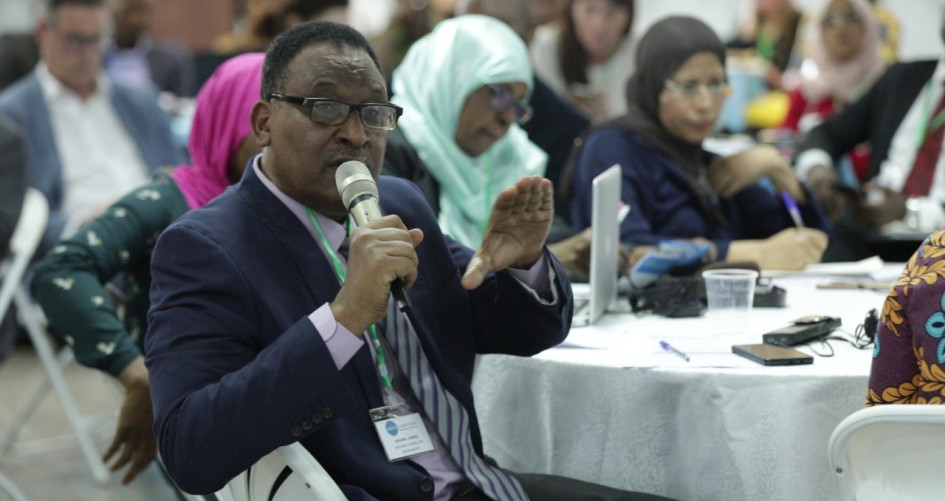UN Climate Change News, 16 May 2019 - Africa Climate Week – held in March in Accra, Ghana – demonstrated the strong commitment of the region to implement ambitious climate action to meet the objectives of the Paris Agreement on climate change. With rapidly growing economies and the ambition to become ‘a global powerhouse’ – as outlined in Africa’s Agenda 2063 – the need to grow sustainable economies while building resilience to the inevitable impacts of climate change has never been so pronounced.
This feeling was mirrored at the Regional Dialogue on Nationally Determined Contributions (NDCs) – organized as part of Africa Climate Week – where participants expressed the need for NDCs to be deeply anchored in African development priorities such as poverty eradication, food security, and adaptation to the adverse impacts of climate change. NDC are national climate action plans under the Paris Agreement.
Africa Climate Week and the Regional Dialogue on NDCs for Africa came at a critical point in the international climate process. 2020 is the first year that countries are to submit new or revised NDCs to the UNFCCC Secretariat, following their original contributions in 2015.
The submission of new or updated NDCs offers a good opportunity for African countries to better integrate climate change into national development planning and to make it a collective priority for the region. Long-term development strategies, which countries are also invited to submit next year, can provide a useful blueprint for achieving the milestones for such a resilient, net-zero-emission development trajectory by 2050.
In addition to better aligning climate and development priorities, here are five reasons for submitting new or updated NDCs in 2020:
- First, submitting new or updated NDCs is an opportunity to reflect the current reality and progress on the ground in countries. In many countries, improvements in technologies, data, policies, partnerships, and stakeholder engagement since 2015 have quickly advanced climate action. Furthermore, many countries have developed plans or targets outside the climate process in relation to renewable energy, short-lived climate pollutants (SLCP), deforestation, or transport. 2020 NDCs can articulate these impressive achievements and countries’ plans to build on them going forward. For example, because of newly available forestry data and a recently developed SLCP plan, Cote d’Ivoire is planning to include forestry and SLCP in its next NDC, which will significantly increase the ambition of its NDC targets.
- Second, preparing new or updated contributions in 2020 provides an opportunity to engage a broader group of stakeholders in the NDC process and increase ownership of climate commitments. For example, sectoral line ministries, local/sub-national actors, and non-Party stakeholders can be more fully involved in the NDC development process, ensuring that sectoral policies, private-sector initiatives, and local efforts are fully reflected in national climate commitments. This may be especially true for countries that rushed to submit contributions ahead of the Paris COP. This broader engagement can also help increase national ownership of NDCs among diverse stakeholder groups.
- Third, the Paris Agreement, the Talanoa Dialogue, and the Intergovernmental Panel on Climate Change special report make clear the need to enhance ambition globally in order to achieve the long-term goal of the Agreement. NDCs submitted in 2020 have the potential to collectively put the world on a more ambitious trajectory toward this goal, and can be guided by countries’ long-term strategies. The Talanoa Dialogue has provided an opportunity to exchange experiences and take stock of collective action toward the Paris goal, which will also inform countries’ 2020 NDCs.
- Fourth, 2020 NDCs provide an important opportunity to demonstrate countries’ climate leadership on the world stage. In addition to clearly articulating globally countries’ direction over the coming years, 2020 NDCs can provide important long-term signals to development partners and the private sector. This can serve to attract international support in the context of climate action and inform investment decisions by the private sector.
- Finally, 2020 NDCs will be a key starting point for Paris processes that are meant to track progress and inform countries in updating their climate goals over time (reflected in NDCs with progressively enhanced ambition every five years). The recent Katowice (COP-24) climate package, or “rulebook,” provides further guidance on how to operationalize the Paris Agreement. This includes guidance on facilitating clarity, transparency, and understanding of future NDCs, as well as on NDC accounting, adaptation components, and the enhanced transparency framework – in particular with regards to the tracking of progress.
The Regional Dialogue on NDCs for Africa was organized as part of Africa Climate Week by the UN Development Programme, UN Climate Change (UNFCCC Secretariat), and the African Development Bank, and attracted participants from over 45 countries across the continent. While several African countries expressed their intention to go back to the drawing board and prepare new or updated NDCs by 2020, Africa Climate Week also underscored the need for increased financial flows to the region. This will be crucial in order for climate ambitions to keep pace with Africa’s determined development efforts.
This article was written by Michael Comstock, UNDP, and Bernd Hackmann, UN Climate Change
